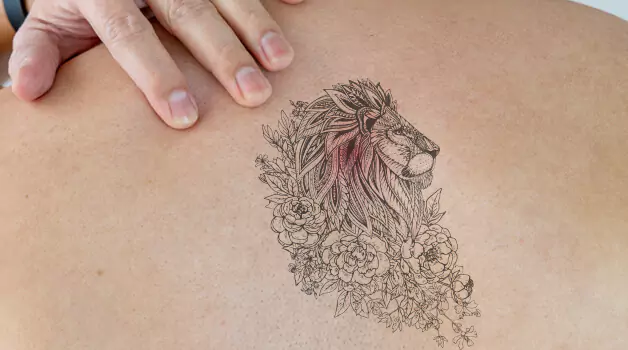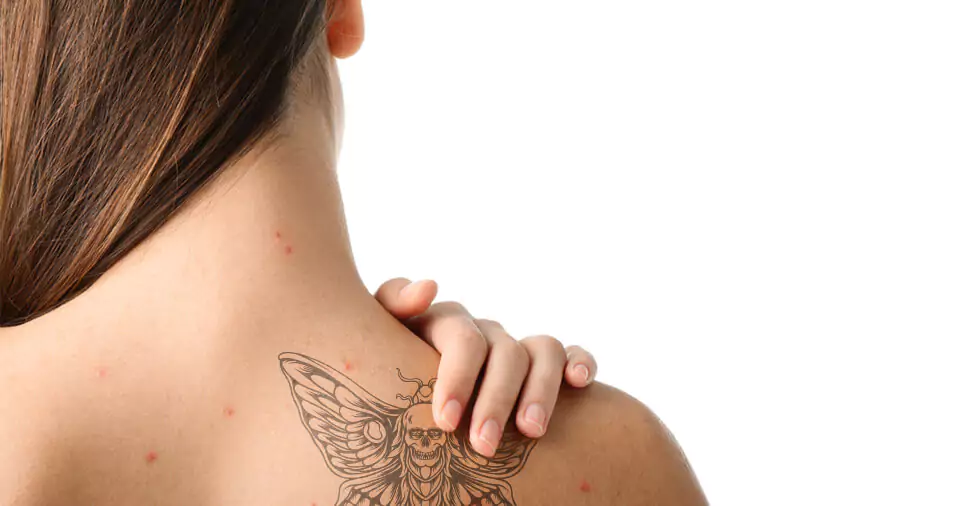Acne is like those annoying cousins of yours that you can’t really kick out of your house nor can you tolerate them. They are like pesky blemishes that seem to pop up at the most inconvenient times and can really put a damper on your tattoo dreams. And there is no cure or magic that would make your acne disappear within an hour. Let’s say you decided to get a tattoo, planned the design you want to get, and squeezed some time out of your busy schedule for the tattoo session, everything looks fine! But just the day before your tattoo session you got an acne breakout, now what do you do? Can you tattoo over acne?
You can tattoo over acne but it is not recommended. Tattooing over acne breakout could cause several issues like increased pain and bleeding during the tattooing procedure, delayed healing, infection, compromised tattoo end result & keloid formation. Acne breakout is bad on its own, and when you try to get a tattoo over it, the situation may get worse. In today’s article, we are diving into the interesting topic of tattoos and acne, if you can get a tattoo over acne, and more!
Tattoo Over Pimples or Acne Breakout

You may think acne only appears on your face, but in reality, it can appear on pretty much any part of your body. You may never expect where it could appear and ruin your perfect plan of doing something like getting a tattoo. Pimples are not the same as acne yet tattooing over pimples is not recommended either. Tattooing over pimples and acne can spread bacteria and cause secondary infection. And it can worsen existing pimples.
Simply put, you should not get a tattoo over acne breakouts or pimples. Even small or minor acne has the potential to spread bacteria and germs all over the skin. Acne can create small pus or space under the skin, the tattoo ink may fill up the space and give a weird appearance over the skin. It can complicate the matter and may end up ruining the tattoo design.
Possibility of tattooing over acne
We all know that acne can be a real party crasher, but don’t let it rain on your tattoo parade just yet! First things first, it’s crucial to consult with both a dermatologist and an experienced tattoo artist. They can provide you with expert opinions on is your acne-prone canvas is suitable for inking or not. They’ll consider the severity of your acne, discuss any potential risks, and help you map out the best approach to achieve your dream tattoo. So, don’t be shy, schedule those consultations and get the expert advice you need.
✨ You May like: How to Remove Sticky Residue From Tattoo Bandage?
7 Factors To Consider Before Tattooing Over Acne
It is recommended to not get a tattoo over acne in general. But there are exceptional cases where you may get a tattoo over acne without any issues. How could you determine if it is okay or not okay to get a tattoo over your specific acne? Make sure to read to following factors to determine that.
- Consult the professionals: Reach out to a dermatologist and a professional tattooer to get their expert advice. They can assess your acne condition, and skin suitability, and discuss any potential risks or complications. Making such a decision on your own is not the brightest idea.
- Timing of the session: Give your skin a break! If you’re experiencing an active acne breakout, it might be best to wait until things calm down. Let your skin heal and choose a time when your acne is under control for a smoother tattooing experience.
- Skin sensitivity: Your skin sensitivity can play a crucial role here. Talk to your tattoo artist about your skin’s sensitivity. Skin with acne can be a bit more sensitive than usual skin, so it’s important to communicate any concerns. They may have tips or modifications to make the process more comfortable for you.
- Healing and aftercare: Understand that tattooing over acne scars may require extra care during the healing process. Follow your artist’s aftercare instructions diligently to ensure proper healing and minimize any potential complications.
- Long-term management: Consider the long-term implications of both your acne and tattoo. Think about how your acne might affect the appearance of the tattoo over time and discuss any concerns with your tattoo artist.
- Realistic expectations: While tattoos can be amazing for covering scars, it’s important to have realistic expectations. Acne scars may still be slightly visible under the tattoo, so discuss this with your artist to understand the potential outcome.
- Personal comfort: Ultimately, it’s your body and your decision. Take your time, weigh the pros and cons, and make sure you’re comfortable with the idea of tattooing over acne scars before moving forward.
5 Risks & Limitations When You Get Tattoo Over Acne

If it is a severe case of acne and you get a tattoo over it then there are some possible risks & limitations you may face. Such as:
1. Infection risk
Tattooing over acne-prone skin poses a slightly higher risk of infection. Open acne lesions can provide an entry point for bacteria, so it’s essential to ensure that the tattooing process is carried out in a sterile environment by a reputable and experienced tattooist.
2. Uneven texture
Body acne can create uneven skin texture. While tattoos can effectively cover scars, they might not match the texture and create an uneven texture which may look odd. Even professional tattoo artists may have a hard time making an even texture by tattooing to cover the acne scar. Not to mention acne can change skin tone which may create difficulty during tattooing.
3. Healing challenges
Tattooing on skin that has acne may have a slower healing time compared to healthy skin. This means that the tattooed area may take longer to heal, and there’s a potential for extended redness or irritation. It’s vital to strictly follow the aftercare instructions provided by your tattooist and consult with them if you have any concerns during the healing process.
4. Potential for skin sensitivity
Skin with acne tends to be more sensitive and reactive. The tattooing process can potentially trigger an adverse reaction or cause increased redness and swelling in the tattooed area. Communicate openly with your tattooist about your skin’s sensitivity, and they can make adjustments to ensure a more comfortable experience.
5. Scar visibility
While tattoos can effectively cover acne scars, it’s important to note that some scars may still be slightly visible even after getting inked. The success of scar coverage depends on factors such as:
- Scar depth
- Color
- Your skin’s individual characteristics
- The expertise of your tattoo artist
Consulting with a skilled tattoo artist who specializes in scar cover-ups can help manage expectations and create a design that maximizes scar camouflage.
7 Ways To Prepare Acne Prone Skin For Tattooing

Preparing your skin with acne for tattooing requires some extra care and attention to ensure a smooth and successful tattooing experience. Here are some essential steps to follow:
- Eat a balanced diet: You are supposed to eat a balanced diet in general, but when you have acne issues you have to follow a healthy and balanced diet plan like your life depends on it. No excessive sugary drinks, no fast food, and no extra fatty food. Try to eat plenty of fruits and vegetables daily to reduce acne and prepare your skin for tattooing.
- Drink plenty of water: Drink water and keep your skin hydrated.
- Clean your skin daily: Use a gentle cleanser that has benzoyl peroxide or salicylic acid to clean the affected area daily. Do not let oil or dirt build over acne as it could further complicate things and delay the tattoo session even more.
- Choose adequate skincare: Lotion, moisturizer, or cream whatever you use, make sure it suits your skin. If it does not suit your skin or contains any harmful chemical it may increase the acne issue you have.
- Wait for the skin to heal: Patience is crucial. If you are doing everything you can and still have active breaks out then consider waiting for a bit more. Getting a tattoo while you have an active breakout can lead to complications. So, waiting could be a way to prepare your skin for tattooing.
- Avoid harsh treatments: Refrain from using harsh acne treatments, such as strong chemical peels or aggressive exfoliants, in the weeks leading up to your tattoo appointment. These treatments can sensitize your skin and make it more vulnerable during the tattooing procedure.
- Drink plenty of fluid: Hydration or drinking plenty of water can help keep your skin healthy and reduce the acne issue. You may drink fruit juice or smoothies to provide crucial nutrients to your skin so that it can fight off the acne and prepare for the tattooing procedure.
Aftercare For Acne Prone Skin After Getting A Tattoo

After you’ve got yourself a brand-new tattoo on your acne-prone skin, it is time to give it some extra TLC during the aftercare process. Here’s what you need to know regarding aftercare for acne-prone skin after getting a tattoo.
1. Keep it clean
Cleanliness is the name of the game. Gently wash your tattooed area with mild, fragrance-free soap and lukewarm water. Make sure to use a cleanser that has benzoyl peroxide or salicylic acid. After every wash pat the area dry with a paper towel or let it air dry. Just avoid rubbing or scrubbing the area when you wash.
2. Moisturize
Your tattooed skin needs some hydration to heal and stay healthy. Apply a thin layer of a gentle, unscented moisturizer to keep your skin nourished. Be sure to choose one that won’t clog those precious pores or the acne issue might come back and wreak havoc.
3. Avoid scratching
Resist the temptation to scratch or pick at your tattoo. During the healing phase, new tattoos feel a bit itchy which is normal, but your acne may increase the itchiness. No matter how much it itches, do not scratch!
I know it’s like trying to resist eating the last slice of pizza, but trust me, it’s for the best. Scratching can irritate the skin, disrupt the healing phase, and increase the risk of infection. Not to mention the more you touch the skin, the more chance there is for an acne outbreak. Let that artwork heal in peace. You may gently tap the tattooed area to soothe the itchiness.
4. Avoid direct sunlight
The UV rays of direct sunlight can damage your tattoo by fading it and can increase your acne issue. So, make sure to avoid direct sunlight as much as you can. And apply sunscreen when you go out in the sun. Limiting sun exposure is especially pivotal while our tattoo heals.
Tattoo & Acne Affecting Skin

To understand why it is recommended not to tattoo over acne and sometimes it is permissible to tattoo over acne, you need to understand how acne can affect your skin.
All right, let’s dive into the topic of how acne can wreak havoc on our precious skin. Those pesky pimples and blackheads love to set up camp on our skin, causing all sorts of trouble. Acne can leave our skin feeling oily, irritated, and downright grumpy. It can create a bumpy texture that feels like a tiny rollercoaster ride on our faces. And let’s not forget the occasional pop-up of red, inflamed zits that seem to have the worst timing ever. Zits, acne, and pimple appearing before the tattooing session is the last thing you want. Getting a tattoo would only increase the inflammation and chance of germs spreading to other parts of the skin and causing infection. Not to mention it is super difficult to work on bumpy skin for tattoo artists. And acne can create small pockets under your skin, when you get a tattoo ink may easily fill up these pockets. It would make the tattoo design lose its shape and appear odd.
Getting Tattoo To Cover Acne Scars

Acne has a way of leaving souvenirs behind in the form of scars. Once those pimples have said goodbye to you, they may sometimes leave behind reminders of their visit in the form of acne scars. These little reminders can take various shapes and sizes, from shallow depressions to raised, bumpy areas. They’re like tiny memoirs etched into our skin, telling the story of battles fought and conquered. Acne scars can affect your confidence and make you self-conscious about your appearance. But fear not, my friend, because there are ways to minimize their appearance and rock that radiant skin you deserve.
One epic solution for those pesky scars caused by acne is getting a tattoo to cover them up! It’s like turning your skin into a canvas for an inspiring work of art. Imagine transforming those reminders of past battles into something beautiful, something that tells a story of strength and resilience. With the help of a skilled tattooist, you can embark on a journey of self-expression and rock a tattoo that not only covers those acne scars but also celebrates your uniqueness.
A talented tattooer can work their magic and design a masterpiece that seamlessly incorporates the scars into the artwork. They can use shading and color techniques to create depth and dimension, making the scars blend harmoniously with the rest of the design. It’s like an optical illusion that turns imperfections into elements of beauty. So, say goodbye to self-consciousness and hello to a new chapter where your skin becomes a living work of art.
Expectation & Reality
Hold on my adventurous friend, there are a few things to consider before taking the plunge. It’s important to have realistic expectations and understand that while tattoos can effectively cover acne scars, they may not completely erase them. The texture of the scars might still be slightly visible under the tattoo. Additionally, it’s crucial to consult with both a dermatologist and a skilled tattooer to ensure your skin is ready for this transformative journey. They can guide you on the best approach, assess the condition of your skin, and recommend the ideal tattoo placement to achieve the desired results. Not all acne scars can be hidden by tattoo completely, so make sure to keep your expectations low and realistic. So, get ready to embrace the power of ink and embark on a journey to rock some seriously awesome inked skin!
3 Ways To Cover Acne Scars With Tattoos
When it comes to covering acne scars with a tattoo, the possibilities are endless. I have listed 3 crucial ways you can hide scars using tattoos.
1. Customized designs
Tattoo artists are the ultimate masters of customization. They can create unique designs that strategically incorporate your acne scars into the artwork. Whether it’s
- Floral patterns
- Geometric shapes
- Intricate mandalas
they can work their magic to make your scars a seamless part of the overall design. It’s like turning your scars into hidden treasures waiting to be discovered.
2. Shading and color techniques
Tattoo artists are the Picassos of skin. With their expert shading and color techniques, they can create depth and dimension that cleverly minimize the appearance of acne scars. By playing with light and shadow, they can give your tattoo a three-dimensional effect that draws attention away from the scars and onto the stunning artwork. It’s like creating an optical illusion where the focus is on the artistry, not the scars.
3. Placement and size considerations
Choosing the right placement and size of your tattoo can also play a significant role in covering scars caused by acne. Working closely with your tattooist, you can explore options that strategically position the tattoo to camouflage the scars effectively. For example, a larger tattoo on your back or chest can draw attention away from facial scars. Similarly, smaller tattoos can be strategically placed to divert attention from specific scarred areas. It’s all about finding the perfect balance and creating a tattoo that not only covers the scars but also complements your unique style.
Final Thoughts
If you are still confused about whether you should get a tattoo over acne or not, the answer is not a simple yes or no. Tattooing over acne-prone skin requires careful consideration, consultation with professionals, and a little extra TLC. If it is a small white bubble head then tattooing is doable, but if it is a full-on outbreak then it is highly recommended not to tattoo over it.
First and foremost, timing is everything. It’s generally best to wait until your active acne has calmed down and your skin has had a chance to heal before getting a tattoo. Tattooing over inflamed or irritated skin can be uncomfortable and may increase the risk of complications. So, give your skin some love, let it do its thing, and consult with dermatologists and tattoo artists to find the optimal timing for your tattooing adventure.
✨ Next Attraction: How Long After a Sunburn Can You Get a Tattoo?

